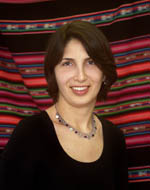by Brian Connors Manke
photo by Tim Collins
Having volunteered at and done research in conjunction with domestic violence shelters, Gender and Women’s Studies professor Cristina Alcalde has witnessed the journey of many women who have faced violence in their lives.
But, as she continued to intensively study domestic violence both in her homeland of Peru and in Texas where she was an assistant professor of anthropology at Southwestern University, Alcalde realized she needed to try and understand the complex issue as a whole.
“Women have told me that a man has done this or that and I’ve seen the marks on a women’s body, but I hadn’t talked to men. Ethically I couldn’t focus on men who were abusive and women who were battered at the same time,” Alcalde said.
 Which has led her to her current research project - Violent and Non-Violent Discourses of Masculinity among Latinos in the U.S. – a study that she hopes will be able to examine more than just abusive men – which she believes has been where most studies have concentrated previously.
Which has led her to her current research project - Violent and Non-Violent Discourses of Masculinity among Latinos in the U.S. – a study that she hopes will be able to examine more than just abusive men – which she believes has been where most studies have concentrated previously.
In the exploratory stage right now, Alcalde is hoping to “look at how is it that men choose not to be violent instead of focusing on the violence.”
In order to accomplish her research goals, Alcalde will be employing the same techniques she did when interviewing battered women – understanding abuse not simply from the act of violence, but by using the ‘life history approach’ which allows a discussion of more than just the traumatic episodes of abuse.
Alcalde knows that this project could bring numerous hurdles. “Trust will be the major obstacle,” Alcalde stated.
“I need to let them know that it’s not about blaming it’s about understanding. I’m not looking for ‘Why do you batter?’ - that’s not my question. It’s more about ‘Tell me about your life so I can understand about the connection between masculinity and violence – and therefore, masculinity and non-violence.’ If I frame it in broad enough terms it should be useful for men and for women because I don’t want to approach it in the sense that I’m coming in here to be able to say ‘Why is it you are violent?’ - I don’t want to generalize.“
“I’m interested in their lives – masculinity, violence and migration are the key factors that I want to look at,” Alcalde mentioned.
With so many Latinos coming to the United States, Alcalde is definitely interested in how migration and masculinity are linked. “Their own ideas about being a man – how was it changed when they came to Lexington, Louisville or Shelbyville?”
As she begins her research on this project, Alcalde admittedly said she doesn’t know that much about the Latino community in Lexington, but she knows that it is certainly growing and is eager to discover more about the community.
Alcalde went to high school in Louisville and got her undergraduate degree from the University of Louisville. Since that time, whenever she’s come back to Kentucky in the last 15 years or so, she’s noticed how much larger the Hispanic populations have grown. She says that being Latino has become less of an “issue” and that Latinos have become just part of the fabric of society.
That’s not to say stereotypes of Latinos aren’t still prevalent.
“We really need positive role models, because so much of the media attention is focused on abusive men and violent men. I want to constructively contribute to that without taking away attention from the fact that violence is a huge problem.”
“I think a lot of men and women in the Latino community, especially when there is the assumption of them being undocumented, even if they aren’t – is that they are not being viewed as a whole person and we’re only seeing one aspect of their identity. So, I want to look at the multi-dimensional aspect – what does it mean to be a man – race, class, language, upbringing – how do they contribute to their own sense of themselves. Construct a more holistic picture than is being painted right now.”
With her personal connections to the state of Kentucky and her Latino background, Alcalde is passionate about work that reaches past the walls of an institution. “The potential that it can contribute to something broader not only academically with gender and women’s studies, but if it can contribute to the community, that to me is really important to my research.”
